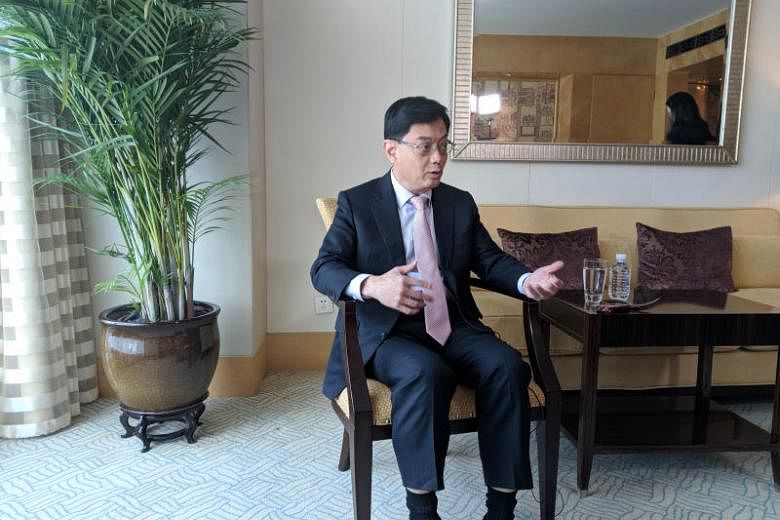BEIJING - The world needs to do its best to de-escalate the mounting United States-China trade conflict as there is a risk of the tensions growing into something more difficult, Finance Minister Heng Swee Keat said on Friday (Oct 19).
China has shown great restraint in responding to the US, he told Singapore reporters in Beijing at the end of a three-day visit.
One way the world can do its part in finding a constructive solution to the issue is by studying how World Trade Organisation rules need to be changed to take into account the changing structure of the global economy, he said.
Another way would be to speed up the conclusion of initiatives such as the Regional Comprehensive Economic Partnership (RCEP), an Asean-led free trade pact comprising 16 countries, including China.
The 16 countries have resolved to conclude the pact by the end of the year.
"Within the region, we need to step up our efforts to sustain the momentum for free trade and to build support for continued liberalisation," said Mr Heng.
He added that such regional deals should be "building blocks and not stumbling blocks" towards a global agreement.
"Our goal must be to have liberalisation at a global level and to ensure that the support for open rule-based multilateral trade remains strong," he said.
He added that trade tensions are already having a negative effect on the global economy, noting that the International Monetary Fund cut forecasts for global growth next year from 3.9 to 3.7 per cent.
The tensions are also creating uncertainty in the global environment which will not be conducive for investments, he said.
The world's two largest economies are locked in an ongoing trade war, and both the US and China have imposed tariffs on billions of dollars' worth of each other's imports.
Mr Heng said the Chinese have been studying ways of mitigating the impact of the dispute, including by promoting domestic consumption.
But he added that a big economy like China needs to continue to reform and open up, allowing it to create competitive pressures and seek new opportunities.
"We hope that they can succeed because China's growth and stability will be important to the region's growth and stability," he said.
Mr Heng was in Beijing along with Deputy Prime Minister Tharman Shanmugaratnam. On Thursday (Oct 18), both leaders met Vice-Premier Liu He, and attended an anniversary dinner to commemorate sovereign wealth fund GIC's 20th year in China.
Mr Heng also visited Chinese start-ups and met other Chinese leaders including Mr Guo Shuqing, chair of the China Banking Regulatory Commission.
He left Beijing for Singapore on Friday.


